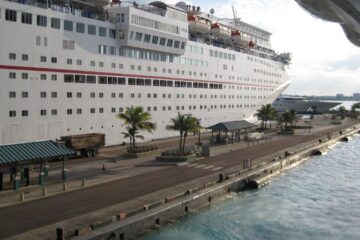There are different reasons why countries may warn their citizens about travel to a foreign country.
Each nation has other countries with which it does not have diplomatic relations (citizens who come, therefore, are at risk of not being able to contact an embassy or get consular help if they run afoul of an authoritarian regime) but both permanent and temporary advisories are also issued for everything from rising levels of crime to environmental events such as storms, hurricanes and earthquakes.
Related: This is why the State Department is warning against Germany travel
Across the ocean, the United Kingdom Foreign Office warned British citizens coming to the U.S. for business or holidays about an “above-normal hurricane season” that is expected to last throughout 2024.
‘Hurricane season normally runs from June to November’
With recent hurricanes like Beryl and Debby running through Florida and upwards to New York (two of the most popular U.S. states for Brits to visit), those coming have been warned to exercise caution and “follow the advice of local authorities” if they find themselves in the middle of a storm.
“The Atlantic hurricane season normally runs from June to November,” the Foreign Department recently wrote in an update to its citizens. “The Pacific hurricane season normally runs from May to November. Hurricanes can affect coastal regions, Hawaii and Guam. The South Pacific tropical cyclone season normally runs from November to May and can affect American Samoa.”
More on travel:
Another National Park just made it more difficult for you to visitDelta Air Lines makes a baggage change that travelers will likeUnited Airlines passenger incident triggers quick response
The advisory also points out that a storm could trigger volcanic activity in places such as Alaska, Hawaii, California, Washington and Oregon.
Related: Get the best cruise tips, deals, and news on the ships from our expert cruiser
‘Advice about what to do before, during and after a tornado’
While the extended advisory is meant to draw travelers’ attention to everything from tornadoes to wildfires, it was issued because hurricane season has been particularly strong and extended this year. That said, instructions to follow local authorities’ guidance (including orders to evacuate if necessary) and be aware of changing weather events extend toward every type of natural disaster.
“Tornadoes can happen at any time depending on weather conditions,” the advisory reads further. “The FEMA website has advice about what to do before, during and after a tornado.”
The U.S. also has similar warnings about extreme and unpredictable weather in a number of countries. Those dreaming of a polar exhibition to Antarctica need to be aware of environmental hazards posed by extreme and unpredictable weather and limited emergency services” while the State Department and American embassy in Japan have been warning visitors to the country about the ongoing risk of earthquakes.
While some advisories are issued in response to one-time earthquakes or storms (such as the one that hit Taiwan in April), countries such as Japan have an ever-present risk due to its location as a small island off the Asian continent in the Pacific Ocean.
“Japan is the most seismically active piece of real estate in the world,” U.S. Embassy and Consulates in Japan wrote in a recent update. “[…] The consequences of such a quake will vary greatly depending upon the time of day and year that the quake occurs, and no one can predict with any certainty what conditions will be like immediately following an intensive shock.”
Related: Veteran fund manager picks favorite stocks for 2024


